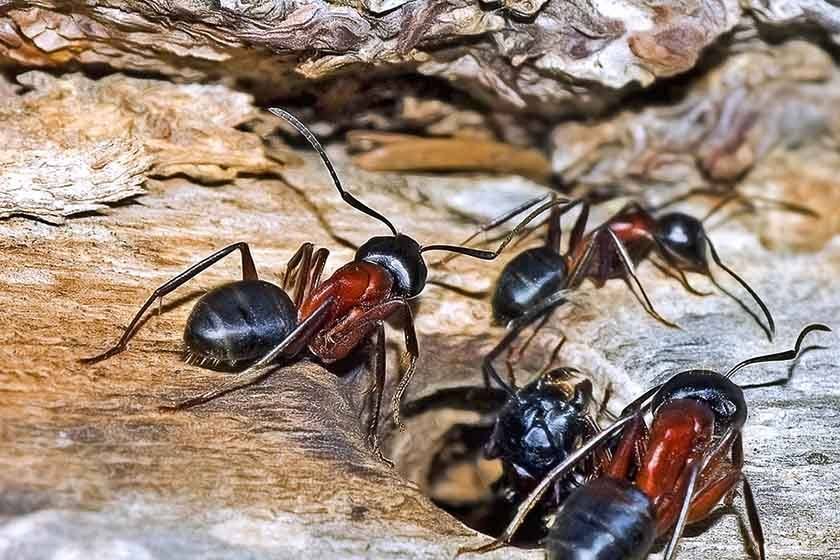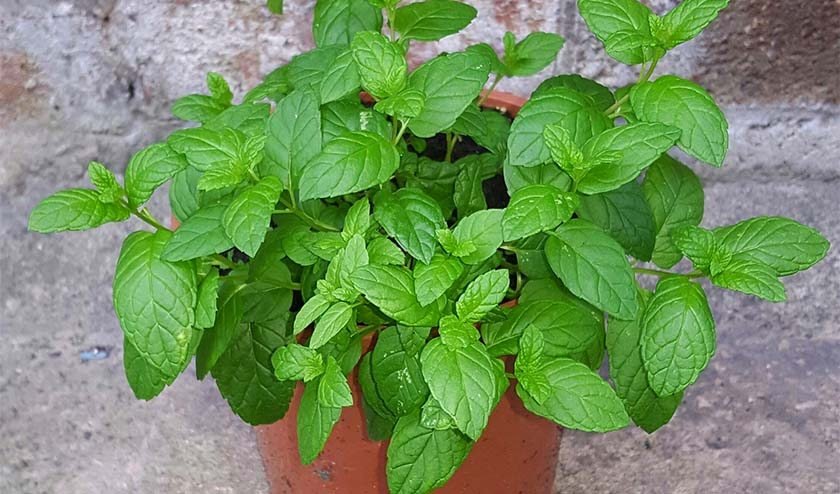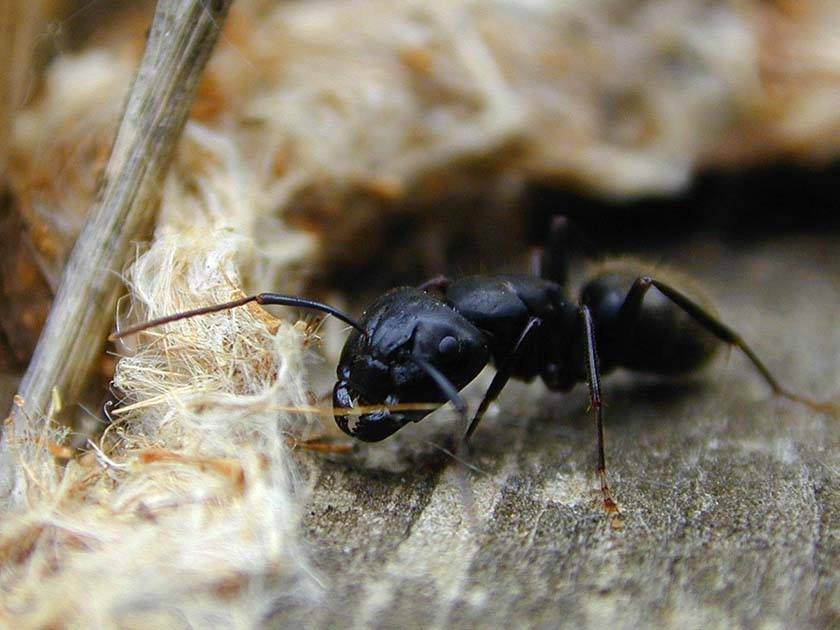Carpenter ants can cause significant damage within residential structures, as they have the capability to chew through wood, thereby compromising the integrity of the building.
It is essential to understand the characteristics of these pests and the advantages of employing natural methods for their removal. This article will examine the signs of an infestation, effective preventative measures, and powerful natural remedies to deter these invaders.
By implementing straightforward steps and eco-friendly solutions, homeowners can discover the best way to get rid of carpenter ants and maintain a healthy home environment.
What are Carpenter Ants?
Carpenter ants are sizeable, black or red insects recognized for their destructive tendencies, primarily nesting within wood and causing considerable damage to homes and structures.
While these ants fulfill an important ecological role as decomposers, their presence can result in significant repair costs if they infiltrate residential properties.
It is essential to comprehend carpenter ant behavior, including their nesting habits and pheromone trails, to implement effective pest management strategies.
Why Get Rid of Carpenter Ants Naturally?
Eliminating carpenter ants through natural methods is essential for ensuring a safe home environment, particularly when evaluating the effects of chemical pest control solutions on family safety and environmental health.
By choosing chemical-free alternatives, homeowners can effectively address infestations while reducing the risks associated with toxic substances. Recognizing the advantages of natural pest control can promote more sustainable practices and contribute to healthier living spaces.
What are the Signs of a Carpenter Ant Infestation?
Indicators of a carpenter ant infestation may be subtle – however, early identification is crucial in preventing significant wood damage and costly repairs.
One should monitor for trails of sawdust, frass, and visible ants, as these can indicate nesting sites and the presence of ant colonies. Recognizing these initial signs is essential for effective pest identification and management.
How to Prevent Carpenter Ants Naturally?
 Preventing carpenter ants naturally requires a comprehensive strategy that emphasizes the maintenance of a clean environment and the use of natural deterrents to mitigate the presence of these pests.
Preventing carpenter ants naturally requires a comprehensive strategy that emphasizes the maintenance of a clean environment and the use of natural deterrents to mitigate the presence of these pests.
Implementing preventive measures like regular home inspections, moisture control, and habitat modifications is the best way to get rid of carpenter ants and significantly reduce the risk of infestation.
By understanding pest behavior and addressing potential attractants, homeowners can effectively protect their properties.
1. Keep Your Home Clean and Dry
Maintaining a clean and dry home is essential in preventing carpenter ants, as these pests are attracted to excess moisture and available food sources.
Regular cleaning reduces clutter and eliminates potential nesting sites, while ensuring dry conditions mitigates moisture accumulation that may attract these invasive pests.
To further enhance pest awareness, homeowners should establish specific cleaning routines that target high-risk areas, such as kitchens, bathrooms, and basements. Promptly addressing spills and regularly sweeping away crumbs can effectively eliminate food sources that may attract these nuisances.
It is also imperative to inspect and rectify any leaks in plumbing or roofing, as damp environments provide an ideal breeding ground for carpenter ants.
Utilizing dehumidifiers in basements and ensuring proper ventilation throughout the home can significantly lower moisture levels, thereby reducing the risk of an infestation.
By maintaining vigilance and implementing these practices, homeowners can work towards creating a pest-free environment more effectively.
2. Seal Entry Points
Sealing entry points is a crucial step in preventing carpenter ants from infiltrating your home, as even the smallest cracks and gaps can serve as entryways for these pests.
Ensuring structural integrity by addressing these vulnerabilities not only aids in pest prevention but also enhances the overall durability of your residence.
To effectively identify these potential entry points, it is essential to conduct a comprehensive inspection of your living space. Attention should be directed toward areas where walls meet ceilings, as well as around windows and doors, where aging seals may have deteriorated.
Applying weather stripping and caulk can significantly mitigate the risk of pests gaining entry. Regular maintenance checks can help detect minor issues before they escalate into more significant problems.
By adopting a proactive approach, homeowners can establish a barrier against carpenter ants and other unwanted intruders, ultimately contributing to a healthier living environment.
3. Use Natural Repellents
Utilizing natural repellents, such as essential oils, represents an effective strategy for deterring carpenter ants without resorting to harmful chemicals.
One of the best ways to get rid of carpenter ants is by using essential oils like peppermint, eucalyptus, and clove, which can disrupt ant pheromone trails and create an inhospitable environment for these pests, promoting sustainable pest management practices.
To maximize their effectiveness, these oils may be combined with water in a spray bottle for convenient application around entry points and nesting sites.
A recommended ratio of 10-15 drops of essential oil per cup of water can yield a potent mixture that not only repels ants but also provides a pleasant aroma.
Along with essential oils, diatomaceous earth – a non-toxic powder derived from fossilized algae – can be applied in areas where carpenter ants are observed.
This substance creates a barrier that damages their exoskeletons, ultimately preventing access without the use of harsh insecticides.
These methods exemplify the advantages of adopting non-toxic pest management solutions, promoting a safer home environment while effectively deterring unwelcome intruders.
What are the Best Natural Remedies for Getting Rid of Carpenter Ants?
Identifying the most effective natural remedies for eliminating carpenter ants can enable homeowners to manage infestations in a sustainable and effective manner.
Treatments such as diatomaceous earth and essential oils provide viable do-it-yourself solutions that are both cost-effective and environmentally responsible.
A thorough understanding of how these remedies function can contribute to successful pest management strategies.
1. Diatomaceous Earth
Diatomaceous earth serves as an effective natural pest control method capable of eliminating carpenter ants by damaging their exoskeletons upon contact, which results in dehydration and death.
This powdery substance is non-toxic to humans and pets, rendering it a preferred choice for environmentally conscious homeowners.
To utilize diatomaceous earth, it is important to first identify areas where carpenter ants are active, such as along their trails, nests, or points of entry.
A thin, even layer of the powder should be applied in these locations, ensuring that it remains dry for optimal effectiveness. Special attention should be given to gaps around windows, doors, and foundations.
It is advisable to wear a mask and gloves during application to prevent inhalation of the dust or contact with the skin. Reapplication may be necessary after heavy rains or disruptions to ensure continuous protection, making it the best way to get rid of carpenter ants effectively in the long term.
2. Borax and Sugar Bait
 Borax combined with sugar serves as an effective natural remedy for carpenter ants, attracting them with sweetness while delivering a lethal dose of poison that disrupts their digestive systems.
Borax combined with sugar serves as an effective natural remedy for carpenter ants, attracting them with sweetness while delivering a lethal dose of poison that disrupts their digestive systems.
This method of pest management is not only straightforward to prepare but also highly effective in controlling ant populations.
To create this bait, one needs to combine equal parts of borax and sugar, ensuring thorough mixing for even distribution.
Subsequently, a small amount of water may be added to form a paste, facilitating easier application. The bait should then be strategically placed near ant trails or nests to effectively attract foraging ants.
It will become apparent that, as ants consume the mixture, they unwittingly transport it back to their colonies, resulting in a decrease in the overall population. This technique underscores the dual benefit of utilizing borax and sugar, offering a practical approach to natural pest control.
3. Essential Oils
Essential oils such as peppermint, eucalyptus, and cinnamon are highly effective natural repellents that can deter carpenter ants from entering residential premises. Their intense aromas disrupt the pheromone trails utilized by ants, thereby serving as effective preventive measures.
Along with these essential oils, citronella and tea tree oil are also recognized for their pest-repellent properties.
These oils can be utilized in various methods, such as employing a diffuser to disseminate their fragrance throughout the home or combining them with water in a spray bottle for direct application at potential entry points.
The scientific basis for their efficacy lies in their chemical compositions – for example, the citral found in citronella creates an unfavorable environment for these pests, while the menthol in peppermint acts as a protective barrier.
By incorporating these natural remedies, homeowners can establish a repellent atmosphere that significantly reduces the risk of infestations.
4. Vinegar Solution
A vinegar solution serves as an effective natural pest control remedy, disrupting the pheromone trails of carpenter ants and hindering their ability to navigate back to their nests. This straightforward and eco-friendly solution can be applied in various areas of the home to deter infestations.
To prepare this solution, mix equal parts of white vinegar and water in a spray bottle. It is advisable to shake the mixture thoroughly before use to ensure a complete blend.
For optimal effectiveness, focus on areas where ants are frequently observed, such as:
- Near entry points;
- Kitchen corners;
- Around indoor plants.
Applying the solution directly onto surfaces frequented by the ants will not only repel these pests but also eliminate their scent trails, which are essential for their communication and movement.
This method offers a great alternative to harmful chemicals, providing homeowners with the best way to get rid of carpenter ants using organic practices to maintain a pest-free environment.
5. Citrus Peels
The use of citrus peels as natural deterrents serves as an effective measure against carpenter ants, as their strong scent is unappealing to these pests. Strategically placing peels around entry points creates a barrier that discourages ants from infiltrating the home.
This approach not only provides a chemical-free alternative for pest control but also maximizes the utility of materials that may otherwise be discarded.
To implement this method effectively, it is advisable to scatter fresh or dried peels in locations where ant activity has been observed, such as near doorways or windows.
For enhanced efficacy, crushing the peels slightly can release more aromatic oils, thereby increasing their effectiveness. Regularly replacing the peels is essential to maintain a strong scent, which reinforces a natural pest awareness and prevention strategy that homeowners can adopt.
With consistent application, individuals may find it easier to sustain a pest-free environment.
What are Some Other Natural Methods to Control Carpenter Ants?
Exploring alternative natural methods for controlling carpenter ants can enhance your pest management strategy by emphasizing non-invasive techniques that safeguard both your residence and the environment.
Strategies such as habitat modification and the removal of attractants can substantially decrease the likelihood of infestations.
1. Remove Attractants
Removing attractants is crucial for effective pest prevention, particularly in the case of carpenter ants, which are drawn to food sources and nesting sites within residential environments. By minimizing potential food sources, such as crumbs and spills, homeowners can significantly reduce the likelihood of attracting these pests.
Implementing routine cleaning practices is essential to ensure that surfaces remain free from food remnants. When looking for the best way to get rid of carpenter ants, it’s important to address not only visible crumbs but also residues that may be hiding in pantry corners and beneath appliances.
Storing food in airtight containers is a proactive measure that prevents access to enticing scents that may attract carpenter ants. Additionally, regularly inspecting for leaks or moisture is of equal importance, as damp environments frequently serve as ideal nesting grounds for these pests.
By addressing these specific attractants, homeowners not only safeguard their living spaces but also create an inhospitable environment for these destructive pests, thereby enhancing the overall effectiveness of their pest management strategies.
2. Use Cedar Wood
Utilizing cedar wood as a building material or in landscaping serves as a natural repellent against carpenter ants, as its scent effectively deters these pests from establishing nests. This approach not only proves effective but also enhances the aesthetic appeal of the property.
Cedar possesses inherent properties that render it resistant to decay and fungal growth, thereby contributing to its longevity and reducing the necessity for chemical treatments.
By incorporating cedar wood into outdoor structures such as decks, fences, or garden beds, homeowners can create both a visually appealing and functional environment while minimizing the reliance on pesticides.
This eco-friendly choice supports sustainable practices and contributes to a healthier ecosystem, free from harsh chemicals that can adversely affect beneficial insects and plants. In summary, the use of cedar wood represents a prudent strategy for effective pest management while preserving the charm and integrity of one’s property.
3. Plant Mint
 Planting mint around one’s residence can act as an effective natural deterrent against carpenter ants, as the scent is unappealing to these pests. This organic solution not only enhances the aesthetic appeal of the landscape but also effectively inhibits ant activity.
Planting mint around one’s residence can act as an effective natural deterrent against carpenter ants, as the scent is unappealing to these pests. This organic solution not only enhances the aesthetic appeal of the landscape but also effectively inhibits ant activity.
Along with its pest-repelling properties, mint flourishes in a variety of environments, making it a versatile choice when considering the best way to get rid of carpenter ants in both gardens and containers.
The lush green leaves and vibrant flowers contribute to the visual allure of outdoor spaces while attracting beneficial insects such as bees and butterflies, thus enriching the local ecosystem.
Moreover, its growth can help prevent soil erosion, contributing to an overall healthier garden. By incorporating this aromatic herb, individuals can enjoy a fragrant plant that serves as both an attractive decorative element and a significant asset in natural pest management.
When to Seek Professional Help?
Recognizing the appropriate time to seek professional assistance for carpenter ant infestations is essential for effective pest management, particularly when natural remedies prove inadequate. Should one observe extensive wood damage or a notable increase in ant activity, it is advisable to consult pest control experts for appropriate treatment of the infestation.
Disregarding these indicators may result in more severe structural damage and escalating costs. Timely intervention is crucial, as a minor issue can rapidly develop into a significant infestation if not addressed promptly.
Homeowners should exercise heightened vigilance during the warmer months, when carpenter ants are most active, as their presence may signify underlying issues related to moisture or concealed nests.
Understanding the implications of a carpenter ant invasion and acting quickly with professional pest management services can not only protect the property but also provide peace of mind.
How to Prevent Future Carpenter Ant Infestations?
Preventing future carpenter ant infestations necessitates a proactive approach that encompasses regular inspections and environmental modifications to mitigate risks.
By understanding carpenter ant behavior and implementing the best way to get rid of carpenter ants through effective pest prevention strategies, homeowners can significantly reduce the likelihood of reinfestation and protect the structural integrity of their homes. Head down to our FAQ section for further information.
Carpenter ants are large ants that can cause damage to wood structures in a home. They tunnel through wood to create nests, which can weaken the structure and lead to costly repairs.
The best way to get rid of carpenter ants naturally is to use a combination of methods, such as diatomaceous earth, vinegar, and essential oils. These natural remedies are safe and effective in eliminating carpenter ants without the use of harmful chemicals.
Diatomaceous earth is a fine powder made from the fossilized remains of diatoms. It works by drying out the exoskeleton of insects, including carpenter ants, causing them to die. It is safe for humans and pets, but should be used with caution as it can irritate the lungs if inhaled.
Yes, vinegar is a natural ant repellent and can help get rid of carpenter ants. Mix equal parts of vinegar and water in a spray bottle and spray it directly on any areas where you have seen carpenter ants. The strong smell of vinegar will repel them and prevent them from returning.
Yes, essential oils such as peppermint, tea tree, and citrus oils have strong scents that can repel carpenter ants. Mix a few drops of these oils with water in a spray bottle and use it to spray on ant trails and entry points. You can also soak cotton balls in the oils and place them near ant-infested areas.
To prevent future infestations of carpenter ants, it is important to keep your home clean and well-sealed. Eliminate any sources of food or water that may attract ants, and seal up any cracks or openings where they may enter. Regularly inspect your home for any signs of carpenter ants and take immediate action if you spot any.

